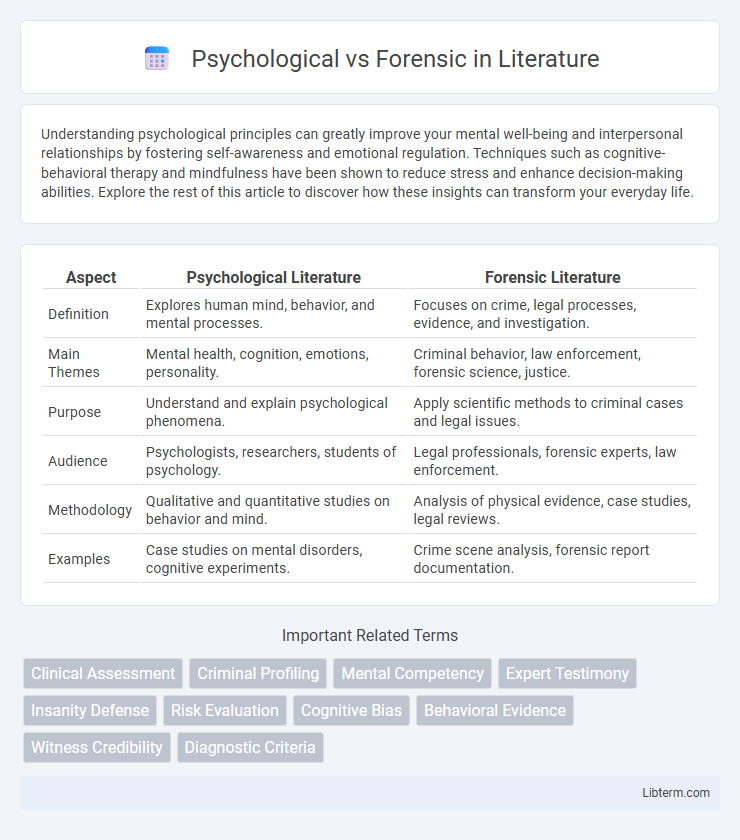Understanding psychological principles can greatly improve your mental well-being and interpersonal relationships by fostering self-awareness and emotional regulation. Techniques such as cognitive-behavioral therapy and mindfulness have been shown to reduce stress and enhance decision-making abilities. Explore the rest of this article to discover how these insights can transform your everyday life.
Table of Comparison
| Aspect | Psychological Literature | Forensic Literature |
|---|---|---|
| Definition | Explores human mind, behavior, and mental processes. | Focuses on crime, legal processes, evidence, and investigation. |
| Main Themes | Mental health, cognition, emotions, personality. | Criminal behavior, law enforcement, forensic science, justice. |
| Purpose | Understand and explain psychological phenomena. | Apply scientific methods to criminal cases and legal issues. |
| Audience | Psychologists, researchers, students of psychology. | Legal professionals, forensic experts, law enforcement. |
| Methodology | Qualitative and quantitative studies on behavior and mind. | Analysis of physical evidence, case studies, legal reviews. |
| Examples | Case studies on mental disorders, cognitive experiments. | Crime scene analysis, forensic report documentation. |
Introduction to Psychological and Forensic Assessments
Psychological assessments involve evaluating an individual's cognitive, emotional, and behavioral functioning using standardized tests and clinical interviews to inform diagnosis and treatment planning. Forensic assessments apply psychological principles in legal contexts, focusing on issues such as competency, risk assessment, and criminal responsibility. Both assessments utilize specialized tools but differ in purpose, with psychological assessments primarily aimed at clinical understanding and forensic assessments designed to address legal questions.
Defining Psychological Evaluation
Psychological evaluation involves a systematic assessment of an individual's mental health, cognitive abilities, and emotional functioning using standardized tests and clinical interviews. It aims to diagnose psychological disorders, inform treatment plans, and understand behavior in various settings, including clinical, educational, and occupational environments. Unlike forensic evaluations, psychological assessments primarily focus on therapeutic outcomes rather than legal implications.
Understanding Forensic Evaluation
Forensic evaluation involves applying psychological principles specifically to legal contexts, focusing on assessing individuals' mental state for court-related decisions. This process includes forensic psychologists conducting interviews, reviewing records, and administering tests to provide objective mental health insights that aid legal determinations such as competency, criminal responsibility, and risk assessment. Understanding forensic evaluation requires distinguishing it from general psychological assessment by its emphasis on legal standards, evidentiary requirements, and the ethical responsibility to the justice system.
Key Differences Between Psychological and Forensic Assessments
Psychological assessments primarily evaluate an individual's mental health, cognitive functioning, and emotional well-being, utilizing tools like clinical interviews and standardized tests to diagnose psychological conditions. Forensic assessments focus on legal contexts, assessing competency, risk of reoffending, and criminal responsibility to inform court decisions. Key differences include the purpose--clinical treatment versus legal outcomes--and the methods, where forensic evaluations often incorporate legal criteria and may be subject to courtroom scrutiny.
Purposes and Objectives of Each Assessment
Psychological assessments primarily aim to evaluate an individual's mental health, cognitive abilities, personality traits, and emotional functioning to inform clinical diagnosis, treatment planning, and personal development. Forensic assessments focus on legal questions such as competency to stand trial, criminal responsibility, risk of reoffending, and custody evaluations, providing objective data to assist courts in decision-making. Both assessments use standardized tools but differ in purpose: psychological assessments guide therapeutic interventions, while forensic assessments serve judicial determinations and legal standards.
Methods and Techniques Used
Psychological methods primarily involve clinical assessments, cognitive testing, and behavioral observations to understand mental health, emotions, and cognitive processes. Forensic techniques incorporate criminal profiling, crime scene analysis, and legal interviewing, utilizing both psychological principles and investigative methods to aid in legal investigations. These approaches differ in their application, with psychology focusing on individual diagnosis and forensic science emphasizing evidence evaluation within legal frameworks.
Ethical Considerations and Confidentiality
Psychological practices prioritize maintaining client confidentiality to protect mental health information, guided by ethical codes such as the APA's standards, while forensic psychology involves complex confidentiality issues due to its legal context where information may be disclosed in court. Ethical considerations in forensic settings require balancing the duty to the individual client with obligations to the legal system, often leading to limited confidentiality compared to traditional psychology. Professionals must navigate informed consent, potential dual relationships, and legal mandates to ensure ethical integrity in both domains.
Qualifications and Training of Professionals
Psychological professionals typically hold advanced degrees in psychology, such as a Ph.D. or Psy.D., and undergo extensive clinical training, including supervised internships and licensing exams to practice therapy or counseling. Forensic professionals often require specialized training in criminal justice or legal studies in addition to psychology credentials, with certifications like the American Board of Forensic Psychology that emphasize knowledge of legal standards and courtroom procedures. Both fields demand continuous education but forensic psychology uniquely combines psychological principles with legal expertise to assess criminal behavior and provide expert witness testimony.
Application Areas in Legal and Clinical Settings
Psychological applications primarily focus on clinical assessments, therapeutic interventions, and mental health evaluations, providing insight into individual behavior and emotional functioning. Forensic psychology applies psychological principles within legal contexts, including criminal profiling, competency evaluations, and expert witness testimony to inform judicial decisions. Clinical settings emphasize diagnosis and treatment, whereas forensic settings prioritize legal implications and evidentiary support.
Conclusion: Choosing the Right Assessment Approach
Selecting between psychological and forensic assessments hinges on the objective, with psychological evaluations focusing on mental health diagnosis and treatment, while forensic assessments aim to inform legal decisions through objective evidence. Understanding case specifics, legal requirements, and ethical standards is crucial to ensure the chosen approach provides accurate, relevant information. The integration of both methods may enhance decision-making in complex cases involving mental health and legal considerations.
Psychological Infographic

 libterm.com
libterm.com